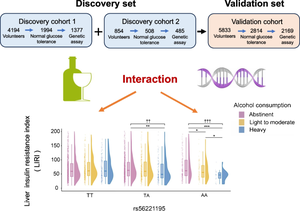Diabetologia ( IF 8.4 ) Pub Date : 2024-10-19 , DOI: 10.1007/s00125-024-06291-5 Qi Fu, Hao Dai, Sipeng Shen, Yunqiang He, Shuai Zheng, Hemin Jiang, Pan Gu, Min Sun, Xiaowei Zhu, Kuanfeng Xu, Tao Yang

|
Aims/hypothesis
Alcohol consumption has complex effects on diabetes and metabolic disease, but there is widespread heterogeneity within populations and the specific reasons are unclear. Genetic factors may play a role and warrant exploration. The aim of this study was to elucidate genetic variants modulating the impact of alcohol consumption on insulin sensitivity and pancreatic beta cell function within populations presenting normal glucose tolerance (NGT).
Methods
We recruited 4194 volunteers in Nanjing, 854 in Jurong and an additional 5833 in Nanjing for Discovery cohorts 1 and 2 and a Validation cohort, respectively. We performed an OGTT on all participants, establishing a stringent NGT group, and then assessed insulin sensitivity and beta cell function. Alcohol consumption was categorised as abstinent, light-to-moderate (<210 g per week) or heavy (≥210 g per week). After excluding ineligible individuals, an exploratory genome-wide association study identified potential variants interacting with alcohol consumption in 1862 NGT individuals. These findings were validated in an additional cohort of 2169 NGT individuals. Cox proportional hazard regression was further employed to evaluate the effect of the interaction between the potential variants and alcohol consumption on the risk of type 2 diabetes within the UK Biobank cohort.
Results
A significant correlation was observed between drinking levels and insulin sensitivity, accompanied by a consequent inverse relationship with insulin resistance and beta cell insulin secretion after adjusting for confounding factors in NGT individuals. However, no significant associations were noted in the disposition indexes. The interaction of variant rs56221195 with alcohol intake exhibited a pronounced effect on the liver insulin resistance index (LIRI) in the discovery set, corroborated in the validation set (combined p=1.32 × 10−11). Alcohol consumption did not significantly affect LIRI in rs56221195 wild-type (TT) carriers, but a strong negative association emerged in heterozygous (TA) and homozygous (AA) individuals. The rs56221195 variant also significantly interacts with alcohol consumption, influencing the total insulin secretion index INSR120 (the ratio of the AUC of insulin to glucose from 0 to 120 min) (p=2.06 × 10−9) but not disposition index. In the UK Biobank, we found a significant interaction between rs56221195 and alcohol consumption, which was linked to the risk of type 2 diabetes (HR 0.897, p=0.008).
Conclusions/interpretation
Our findings reveal the effects of the interaction of alcohol and rs56221195 on hepatic insulin sensitivity in NGT individuals. It is imperative to weigh potential benefits and detriments thoughtfully when considering alcohol consumption across diverse genetic backgrounds.
Graphical Abstract
中文翻译:

基因与饮酒的相互作用影响胰岛素敏感性和 β 细胞功能
目标/假设
饮酒对糖尿病和代谢性疾病有复杂的影响,但人群内部存在广泛的异质性,具体原因尚不清楚。遗传因素可能起作用,需要进行探索。本研究的目的是阐明调节饮酒对葡萄糖耐量 (NGT) 正常人群中胰岛素敏感性和胰腺 β 细胞功能影响的遗传变异。
方法
我们在南京招募了 4194 名志愿者,在裕廊招募了 854 名志愿者,在南京招募了另外 5833 名志愿者,分别用于发现队列 1 和 2 以及验证队列。我们对所有参与者进行了 OGTT,建立了严格的 NGT 组,然后评估胰岛素敏感性和 β 细胞功能。饮酒分为戒酒、轻度至中度(每周 <210 克)或重度(每周 ≥210 克)。在排除不符合条件的个体后,一项探索性全基因组关联研究在 1862 名 NGT 个体中确定了与饮酒相互作用的潜在变异。这些发现在另一个由 2169 名 NGT 个体组成的队列中得到了验证。进一步采用 Cox 比例风险回归来评估潜在变异与饮酒之间的相互作用对英国生物样本库队列中 2 型糖尿病风险的影响。
结果
在调整 NGT 个体的混杂因素后,观察到饮酒水平与胰岛素敏感性之间存在显著相关性,并伴有与胰岛素抵抗和 β 细胞胰岛素分泌的负相关关系。然而,在处置指数中没有发现显著的关联。变体 rs56221195 与酒精摄入的相互作用对发现集中的肝脏胰岛素抵抗指数 (LIRI) 表现出显着影响,这在验证集中得到了证实(组合 p=1.32 × 10-11)。饮酒对 rs56221195 野生型 (TT) 携带者的 LIRI 没有显着影响,但在杂合子 (TA) 和纯合子 (AA) 个体中出现强烈的负相关。rs56221195 变体还与饮酒显着相互作用,影响总胰岛素分泌指数 INSR120 (胰岛素与葡萄糖的 AUC 之比,从 0 到 120 分钟) (p=2.06 × 10-9) 但不影响倾向指数。在英国生物样本库中,我们发现 rs56221195 与饮酒之间存在显着相互作用,这与 2 型糖尿病的风险有关 (HR 0.897,p=0.008)。
结论/解释
我们的研究结果揭示了酒精和 rs56221195 相互作用对 NGT 个体肝脏胰岛素敏感性的影响。在考虑不同遗传背景的饮酒时,必须仔细权衡潜在的好处和坏处。




















































 京公网安备 11010802027423号
京公网安备 11010802027423号